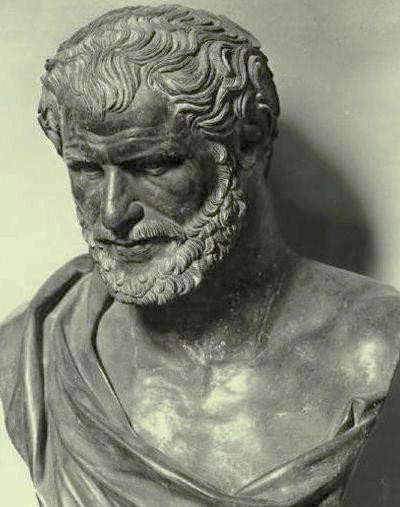Demócrito Frases famosas
Citações de idade de Demócrito
citado em "Ancilla to the Pre-Socratic Philosophers: A Complete Translation of the Fragments in Diels" - página 142 http://books.google.com/books?id=ASijqFryr5IC&pg=PA142, item 9., Kathleen Freeman, Forgotten Books, 1948, ISBN 1606802569, 9781606802564
Física e epistemologia
Fragmento 237
Ética
Fonte: Pré-socráticos, coleção Os Pensadores
Frag. 198
Ética
Fonte: Pré-socráticos, coleção Os Pensadores
“Na realidade, vemos nada, porque a verdade está na profundidade.”
Fragment 117
Física e epistemologia
Citações de homens de Demócrito
“O homem só é infeliz quando é injusto.”
Atribuídas
Variante: O homem não é infeliz, enquanto não é injusto.
“O que faz o homem feliz não é o dinheiro, mas a retidão e a prudência.”
Fonte: http://www.caras.uol.com.br - 12 de novembro de 2009 - EDIÇÃO 836 - Citações http://caras.uol.com.br/citacoes/edicoes/836/
Demócrito frases e citações
frag. 202
Ética
Fonte: Pré-socráticos, coleção Os Pensadores
Frag. 3
Ética
Fonte: Pré-socráticos, coleção Os Pensadores
“"Sábio é quem não se aflige com o que lhe falta e se alegra com o que possui."Frag. 231”
Ética
Fonte: Pré-socráticos, coleção Os Pensadores
“Fama e riquezas sem compreensão é uma posse insegura.”
Fragment 77
Ética
fragmento 181
Ética
Fonte: Pré-socráticos, coleção Os Pensadores
Demócrito: Frases em inglês
“Strength and beauty are the blessings of youth; temperance, however, is the flower of old age.”
Fragment quoted in H. Diels and W. Kranz (eds.) Die Fragmente der Vorsokratiker, Vol. II (1952), no. 294; reference taken from Webster's New World Dictionary of Quotations (2005), p. 261
Source Book in Ancient Philosophy (1907), The Golden Sayings of Democritus
“Those who have a well-ordered character lead also a well-ordered life.”
Source Book in Ancient Philosophy (1907), The Golden Sayings of Democritus
“Moderation multiplies pleasures, and increases pleasure.”
Freeman (1948), p. 163
Variante: Moderation increases enjoyment, and makes pleasure even greater.
“A life without a holiday is like a long journey without an inn to rest at.”
Source Book in Ancient Philosophy (1907), The Golden Sayings of Democritus
Source Book in Ancient Philosophy (1907), The Golden Sayings of Democritus
Source Book in Ancient Philosophy (1907), The Golden Sayings of Democritus
“The hopes of the right-minded may be realized, those of fools are impossible.”
Source Book in Ancient Philosophy (1907), The Golden Sayings of Democritus
Source Book in Ancient Philosophy (1907), The Fragments
“Neither art nor wisdom may be attained without learning.”
Source Book in Ancient Philosophy (1907), The Golden Sayings of Democritus
“Not from fear but from a sense of duty refrain from your sins.”
Source Book in Ancient Philosophy (1907), The Golden Sayings of Democritus
“No power and no treasure can outweigh the extension of our knowledge.”
Durant (1939), Ch. XVI, §II, p. 354; citing J. Owen, Evenings with the Skeptics, London, 1881, vol. 1, p. 149.
“The pleasures that give most joy are the ones that most rarely come.”
Source Book in Ancient Philosophy (1907), The Golden Sayings of Democritus
“Democritus said he would rather discover a single demonstration than win the throne of Persia.”
Source Book in Ancient Philosophy (1907), The Golden Sayings of Democritus
Source Book in Ancient Philosophy (1907), The Golden Sayings of Democritus
“Strength of body is nobility in beasts of burden, strength of character is nobility in men.”
Source Book in Ancient Philosophy (1907), The Golden Sayings of Democritus
By convention sweet is sweet, bitter is bitter, hot is hot, cold is cold, color is color; but in truth there are only atoms and the void. (trans. Durant 1939), Ch. XVI, §II, p. 353; citing C. Bakewell, Sourcebook in Ancient Philosophy, New York, 1909, "Fragment O" (Diels), p. 60
Source Book in Ancient Philosophy (1907), The Golden Sayings of Democritus
“It is hard to fight desire; but to control it is the sign of a reasonable man.”
Freeman (1948), p. 165
Variante: It is hard to fight with desire; but to overcome it is the mark of a rational man.
“The animal needing something knows how much it needs, the man does not.”
Freeman (1948), p. 162
Variante: The needy animal knows how much it needs, but the needy man does not.
“For a man petticoat government is the limit of insolence.”
Source Book in Ancient Philosophy (1907), The Golden Sayings of Democritus
“Fame and wealth without wisdom are unsafe possessions.”
Source Book in Ancient Philosophy (1907), The Golden Sayings of Democritus
“Making money is not without its value, but nothing is baser than to make it by wrong-doing.”
Source Book in Ancient Philosophy (1907), The Golden Sayings of Democritus
“Verily we know nothing. Truth is buried deep.”
Another translation: "Of truth we know nothing, for truth is in a well." Diogenes Laertius, Lives of Eminent Philosophers R.D. Hicks, Ed. http://www.perseus.tufts.edu/hopper/text?doc=Perseus:abo:tlg,0004,001:9:11
Source Book in Ancient Philosophy (1907), The Fragments
Source Book in Ancient Philosophy (1907), The Golden Sayings of Democritus
“[I would] rather discover one cause than gain the kingdom of Persia.”
Freeman (1948), p. 155
Durant (1939),Ch. XVI, §II, p. 352, citinas G.Grote, Plato and the Other Companions of Socrates (London, 1875), vol. 1, p. 68; and citing C. Bakewell, Sourcebook in Ancient Philosophy, New York, 1909, p. 62.
Variante: I would rather discover a single demonstration [in geometry] than become king of the Persians.
Source Book in Ancient Philosophy (1907), The Golden Sayings of Democritus
“To a wise man, the whole earth is open; for the native land of a good soul is the whole earth.”
Freeman (1948), p. 166
Durant (1939), Ch. XVI, §II, p. 352 (footnote); citing F. Uberweg, History of Philosophy, New York, 1871, vol. 1, p. 71.
Variante: To a wise and good man the whole earth is his fatherland.
Source Book in Ancient Philosophy (1907), The Golden Sayings of Democritus
